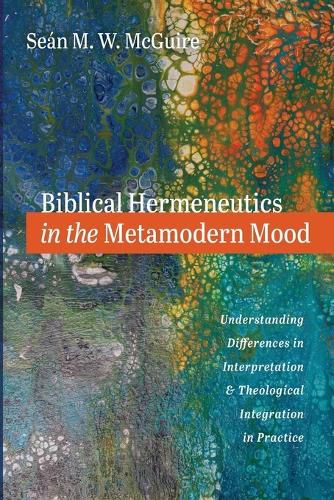Readings Newsletter
Become a Readings Member to make your shopping experience even easier.
Sign in or sign up for free!
You’re not far away from qualifying for FREE standard shipping within Australia
You’ve qualified for FREE standard shipping within Australia
The cart is loading…






This title is printed to order. This book may have been self-published. If so, we cannot guarantee the quality of the content. In the main most books will have gone through the editing process however some may not. We therefore suggest that you be aware of this before ordering this book. If in doubt check either the author or publisher’s details as we are unable to accept any returns unless they are faulty. Please contact us if you have any questions.
Why do contemporary Christians seem to routinely talk past one another amid contentious theological debates? In this illuminating study, Sean M. W. McGuire argues that interpreters' lack of self-critical reflection on the process of interpretation and compounding cultural factors are problematizing interpretive practice. Thus, to work through difficult topics, Christians need to develop the ability to reflect on the complexity informing how they interpret Scripture, and how they see others interpreting Scripture, so that they can coherently and constructively discuss their interpretations with others. Grounding the study in the discipline of practical theology, McGuire utilizes the cultural theory of metamodernism and the hermeneutics of Hans-Georg Gadamer (1900-2002), together with a proposed revision of the Wesleyan Quadrilateral, to develop a paradigm for observing and describing differences in biblical interpretive practice. Using current debates regarding sexuality as an illustrative example, the project reveals the complexity underlying contemporary interpretive practice, showing that amid this complexity the prioritization (or lack thereof) of theological reflection sources prompts certain interpretive conclusions. Perceiving the multivalent nature of interpretation, readers will be equipped to think carefully and critically about how they come to their biblical interpretive conclusions and how those conclusions inform transformed living in Christ.
$9.00 standard shipping within Australia
FREE standard shipping within Australia for orders over $100.00
Express & International shipping calculated at checkout
This title is printed to order. This book may have been self-published. If so, we cannot guarantee the quality of the content. In the main most books will have gone through the editing process however some may not. We therefore suggest that you be aware of this before ordering this book. If in doubt check either the author or publisher’s details as we are unable to accept any returns unless they are faulty. Please contact us if you have any questions.
Why do contemporary Christians seem to routinely talk past one another amid contentious theological debates? In this illuminating study, Sean M. W. McGuire argues that interpreters' lack of self-critical reflection on the process of interpretation and compounding cultural factors are problematizing interpretive practice. Thus, to work through difficult topics, Christians need to develop the ability to reflect on the complexity informing how they interpret Scripture, and how they see others interpreting Scripture, so that they can coherently and constructively discuss their interpretations with others. Grounding the study in the discipline of practical theology, McGuire utilizes the cultural theory of metamodernism and the hermeneutics of Hans-Georg Gadamer (1900-2002), together with a proposed revision of the Wesleyan Quadrilateral, to develop a paradigm for observing and describing differences in biblical interpretive practice. Using current debates regarding sexuality as an illustrative example, the project reveals the complexity underlying contemporary interpretive practice, showing that amid this complexity the prioritization (or lack thereof) of theological reflection sources prompts certain interpretive conclusions. Perceiving the multivalent nature of interpretation, readers will be equipped to think carefully and critically about how they come to their biblical interpretive conclusions and how those conclusions inform transformed living in Christ.